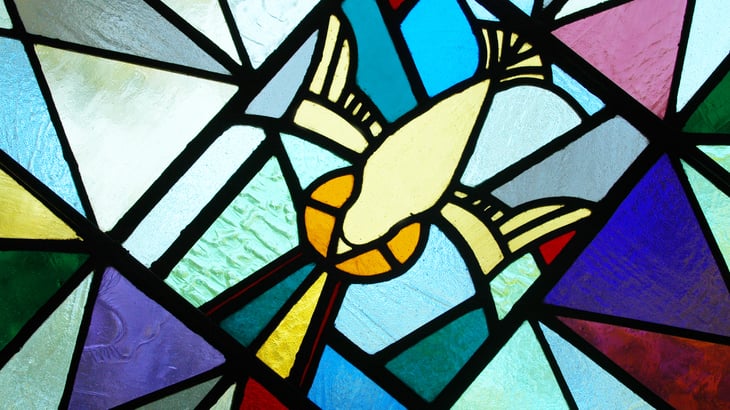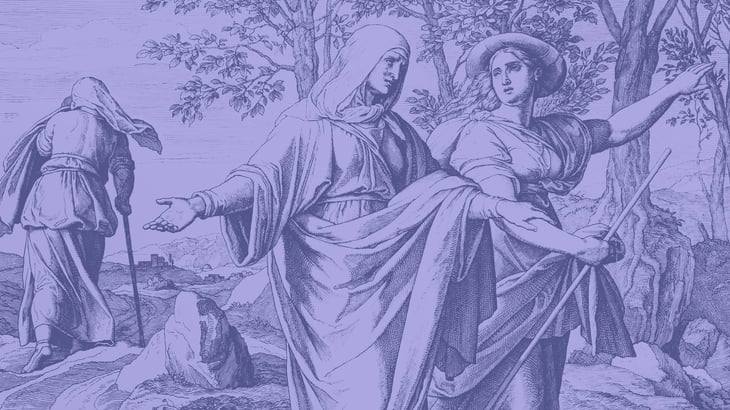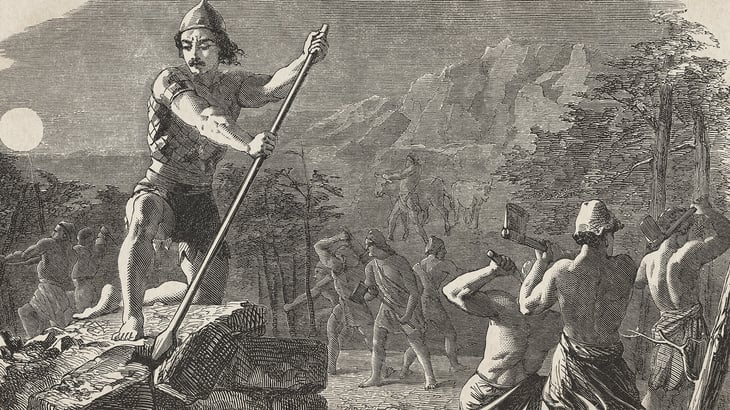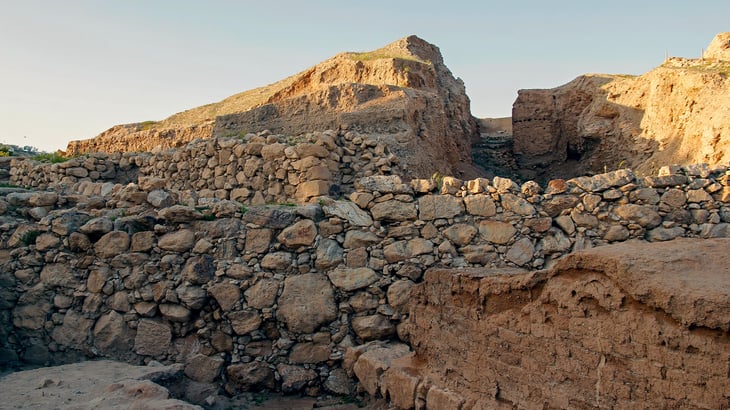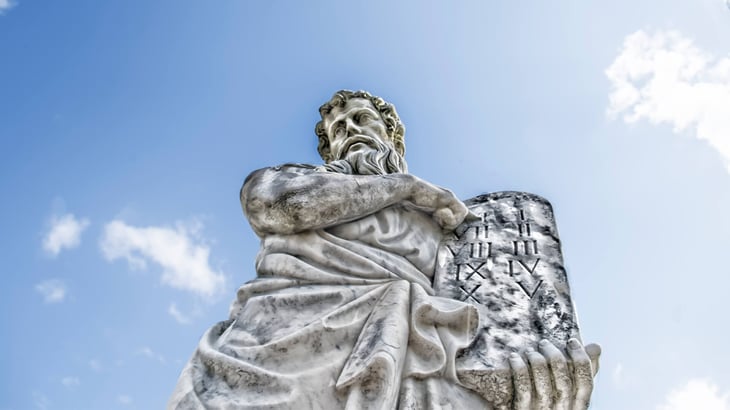The Holy Spirit in Chronicles
The following is an excerpt from volume 1 of The Lutheran Bible Companion on the action of the Holy Spirit in 1 Chronicles and 2 Chronicles.
Elijah: God’s Prophet to the Kings of Israel
Throughout the Old Testament—and especially in the Books of 1 and 2 Kings—God works through prophets to call Israel and her kings back to Him and rebuke their unbelief. The following excerpts from The Lutheran Bible Companion feature one of these instances: the encounters of Ahab and Elijah.
Samuel: Prophet, Priest, and Judge
This blog post is an excerpt from the Lutheran Bible Companion, Volume 1: Introduction and Old Testament.
Redemption and Symbolism in Ruth
This blog post is adapted from Lutheran Bible Companion, Volume 1: Introduction and Old Testament.
One of the first matters to require attention is the real import of Ruth’s oft-quoted speech in 1:16–17, expressing her resolve to accompany Naomi. One should take care neither to read into Ruth’s words more than is actually said nor fail to hear them in total context.
Digging Deeper into Scripture: Genesis 9
Relief had finally come. God created Adam and Eve perfectly. But their wicked transgressions brought sin into the world, taking the Lord’s unblemished creation into destruction. Adam and Eve were expelled from the Garden of Eden, forced to work a stubborn earth, and forced to give birth in pain. Their son Cain killed his brother, Abel, confirming the wickedness of man’s heart.
Seeing this egregious depravity in humanity, God chose to flood the earth, destroying everything. Yet He kept Noah in the faith, making him blameless among his generation. God instructed this servant to build an ark so a pair of every living creature, male and female, could reside during the deluge.
Worshiping Idols in the Book of Judges
This blog post is an excerpt from the Lutheran Bible Companion, Volume 1: Introduction and Old Testament.
By breaking the seemingly innocuous command to “make no covenant with the inhabitants of this land” (Jgs 2:2; cf Ex 23:32), Israel began its downfall. Israel was to be His arm of justice against Canaanite peoples whose measure of wickedness was full and overflowing.
Haggai: A Return from Exile and Reverse Culture Shock
One of the most overlooked books in the Bible is that of the prophet Haggai. Still, this brief book holds a relatable experience to our current context this summer in the United States—a return from exile.
Renewal of the Covenant in Joshua
After God had graciously formed Jacob’s descendants into His covenant people and named them as His own, He provided them a choice for the future: “If you will … then I will … ” Joshua presented this if/then choice to the people at Shechem in the renewal of the covenant. They could continue on the path God established for them, or they could follow the road to destruction by rejecting the covenant.
The Covenant in Deuteronomy
In the Book of Deuteronomy, Moses preaches a series of sermons or discourses to the Israelites as they prepare to cross the Jordan River and enter the Promised Lane. Although each of Moses' discourses has its own emphases, seven points weave back and forth between them, providing a continuous, unified whole. This excerpt from Lutheran Bible Companion speaks on the first five points of the covenant, while the last two points deal with future temptations. Read below to learn more about these themes in the Book of Deuteronomy.
Freedom from Sin in Zechariah 9
This blog post is excerpted from Concordia Commentary: Zechariah.
Zechariah 9:12 begins with a command for the exiles to “return” to the stronghold of Zion (cf. 2:10–11 [ET 2:6–7]) with the promise that Yahweh will “restore” them twofold. Zechariah begins his book with this clarion call: “ ‘Return to me,’ an utterance of Yahweh of armies, ‘and I will return to you’” (1:3). This, along with numerous Gospel promises in 9:9–17, is why the people are not prisoners of despair. Instead the exiles are “prisoners of the hope.” Jeremiah likewise connects God’s promises with “hope” (Jer 29:11; 31:17). “ ‘Hope’ here ... conveys more than a vague belief that the future will somehow be better.” Biblical hope trusts that tomorrow will be better than today because God’s promises are grounded in covenant blood (9:11). Just as Evil-merodach released Jehoiachin from prison (2 Ki 25:27–30), the exiles will also be freed from anguish and gloom.
Slaves of Sin
None of us can say: “I have never been a slave of anyone.” Jesus hammers home this hard reality when he says: “I tell you the truth. Everyone who sins is a slave to sin” (Jn 8:34). All people are conceived, born, and trapped in sin (Ps 51:5–7 [ET 51:3–5]). Locked in habits we cannot beat and bound in a bondage we cannot break. The devil wants to lock us up and throw away the key. The liar keeps whispering: “There’s no way out. Do something drastic. Cut and run. Throw in the towel. Give in, give out, and give up!”
Luther knew this voice. He writes this in his great Reformation hymn: “The old evil foe now means deadly woe; deep guile and great might are his dread arms in fight; on earth is not his equal.” When we believe Satan’s lies, we find ourselves going deeper and farther and longer, until we are bound, tied, and fettered.
Freedom From What Entraps Us
Our striving and planning don’t get us out. Our best efforts and ingenuity are no help. Only the truth sets us free (Jn 8:32). To Nicodemus, caged in the hope- less laws of Rabbinic Judaism, Christ said: “For God did not send his Son into the world to condemn the world, but to save the world through him” (Jn 3:17). To the woman at Jacob’s well, bound to one broken relationship after another, he said: “The water I give will become a spring of water welling up to eternal life” (Jn 4:14). To Peter, who had publicly, openly, and willingly denied him three times, Christ gave three opportunities to confess his love for his Lord and reinstated him three times with the commission to feed his lambs (Jn 21:15–17).
Freedom has a price. On the night before his death, Jesus was bound and taken to Caiaphas, the high priest. He was slapped, spit upon, blindfolded, struck in the face with fists, and beaten by guards. The next morning he was taken to Pilate, who passed him off to Herod. Herod dressed him in a purple robe. Back before Pilate, soldiers stripped and scourged him—just short of death. Struck and spit upon again, he walked the Via Dolorosa. Finally, Jesus was stretched out on two pieces of wood, and three iron spikes were hammered into his flesh
His friends ran away. His possessions were gambled away. His strength was ebbing away. Even his Father turned away. At the end, all he had left was one Greek word, τετέλεσται, “it is finished” (Jn 19:30). But with this single word, our bondage was broken. The sacrifice was complete. Death defeated. Paradise restored. Christ’s resurrection means we are liberated from the liar and our prison doors are opened wide. When Luther finally grasped the Gospel, he experienced this in his Turmerlebnis. “Here I felt that I was altogether born again and had entered paradise itself through open gates.”
No One Can take This Freedom
This same liberating power sets us free from the condemnation of our sin, from the pain of our past, and from worry about our future. No one can take this freedom from us; no law can stop it, and no power on earth or hell can destroy it. And there is more freedom to come. As we walk with Jesus and grow in faith, his liberating power unlocks more and more prison doors. Finally, every believer will experience ultimate freedom in the resurrection of the dead and in the life of the world to come. On that day, God will restore us twofold—and then some! “Your Jesus can repay from His own fullness all He takes away.”
Blog post adapted from Concordia Commentary: Zechariah copyright © 2021 Concordia Publishing House. All rights reserved.
To continue reading commentary from R. Reed Lessing on the Book of Zechariah, order the Concordia Commentary below.
